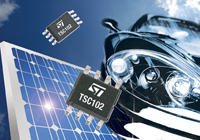STMicroelectronics (ST), a world leader in semiconductors for industrial controls and automotive domain, has developed a current-sensing IC, the TSC102.
 Current-Sensing IC, the TSC102
Current-Sensing IC, the TSC102
This IC will more precisely sense current and help to simplify the design of safer and smarter systems. The IC also provides additional flexibility to designers for adjusting the output of the sensor before feeding the output to the system controller.
The efficient control of equipment used in precision functions like continual self-optimization for maximizing energy efficiency, positioning, and variable speed operation depends on sensing the system current precisely. Accurate current sensing is also needed for a large range of safety mechanisms like auto-stops used in vehicle-window raisers for preventing injury or discomfort to users.
The design of this less power consuming, high-end ST current sensing amplifier facilitates the small current-sensing resistor, with a voltage capability up to 30V, to be directly connected to it. Such a direct connection enables system monitoring without disturbing the system’s ground connection. This requirement is mandatory for monitoring multiple output-based power systems and automotive systems. The TSC102 device is provided with rough inputs to enable it to tolerate applied voltages between -16V and 60V. Such voltage fluctuations are created due to continuous switching of many loads or there is a danger due to reverse battery connections like electrical infrastructures in vehicles.
Two op-amps are integrated into the TSC102. The TSC102 offers designers complete access to pins in the second op-amp, unlike other competing devices. Designers can utilize this access for the implementation of the range of signal-conditioning functions like gain adjustment for optimizing the output signal range. Designers will also be able to configure the op-amp like a comparator. The configuration will help the implementation of the over-current protection feature. The configuration will also enable the op-amp to act as a low-pass second-order filter for stable sensing in noise-troubled systems.
Key features of the current-sensing IC include input common-mode voltage range of 2.8V-30V, 4kV ESD protection, -40 degrees C to +125 degrees C operating temperature range, consumption of current below 420 µA, SO-8 package or RoHS-compliant TSSOP-8 options, industrial-grade variants (TSC102IDT and TSC102IPT), and AEC-Q101 qualified variants (TSC102IYDT and TSC102IYPT).
ST has extended its portfolio of high-end current-sensing amplifiers with the help of the TSC102. The portfolio includes gadgets that are optimized for low-cost, high input voltages, or high precision. The TSC102 product can be purchased in production quantities or as samples.